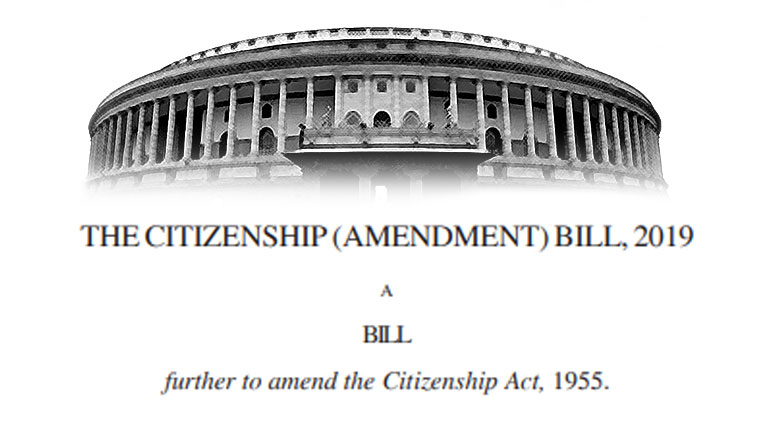Art. 14 of the consitution says " The State Shall not deny any person equality before law or equal protection of the laws within the territory of India".
Citizenship amendment bill, which clearly states that the minorities from Afghanistan, Pakistan and Bangladesh i.e; Parsis, Christians, Hindus,Sikhs,Buddhists and Jains to be eligible for citizenship and not mentioning Muslims which itself is considered as a minority in our country and being a division based on Religion, it led to more controversies in the country.
But what is citizenship? How is it given ?
The Citizenship Act, 1955 regulates who may acquire Indian citizenship and on what grounds. A person may become an Indian citizen if they are born in India or have Indian parentage or have resided in the country for a period of time, etc. However, illegal migrants are prohibited from acquiring Indian citizenship. An illegal migrant is a foreigner who: (i) enters the country without valid travel documents, like a passport and visa, or (ii) enters with valid documents, but stays beyond the permitted time period.
Table 1: Comparison of the Citizenship (Amendment) Bill, 2016, as passed by Lok Sabha, with the Citizenship (Amendment) Bill, 2019
The Citizenship (Amendment) Bill, 2016 (as passed by Lok Sabha)
|
Citizenship (Amendment) Bill 2019
|
|
|
|
|
|
|
The 1955 Act provides that the central government may cancel the registration of OCIs on various grounds. The Bill adds one more ground for cancelling registration, that is, if the OCI has violated any law notified by the central government. It further states that orders for cancellation of OCI should not be passed till the cardholder is given an opportunity to be heard.
It may be argued that giving the central government the power to prescribe the list of laws whose violation result in cancellation of OCI registration, may amount to an excessive delegation of powers by the legislature. The Supreme Court has held that while delegating powers to an executive authority, the legislature must prescribe a policy, standard, or rule for their guidance, which will set limits on the authority’s powers and not give them arbitrary discretion to decide how to frame the rules.[15] The Bill does not provide any guidance on the nature of laws which the central government may notify. Therefore, in the absence of standards, criteria or principles on the types of laws which may be notified by the government, it may be argued that the powers given to the executive may go beyond the permissible limits of valid delegation.
[1]. Section 2(1)(b) of the Citizenship Act, 1955.
[2]. G.S.R. 685 (E) and G.S.R. 686 (E), Gazette of India, September 7, 2015, http://egazette.nic.in/WriteReadData/2015/165755.pdf; G.S.R. 702(E) and G.S.R. 703(E), Gazette of India, July 18, 2016, http://egazette.nic.in/WriteReadData/2016/170822.pdf.
[3]. The Citizenship (Amendment) Bill, 2016, https://www.prsindia.org/sites/default/files/bill_files/Citizenship_%28A%29_bill%2C_2016_0.pdf.
[4]. Report of the Joint Committee on the Citizenship (Amendment) Bill, 2016, Joint Parliamentary Committee, Lok Sabha, January 7, 2019, https://www.prsindia.org/sites/default/files/bill_files/Joint%20committee%20report%20on%20citizenship%20%28A%29%20bill.pdf..
[5]. The Citizenship (Amendment) Bill, 2016 (As passed by Lok Sabha), https://www.prsindia.org/sites/default/files/bill_files/Citizenship%20%28A%29%20Bill%2C%202019%20as%20passed%20by%20LS.pdf.
[6]. State of West Bengal vs Anwar Ali Sarkar, AIR 1952 SC 75.
[7]. Article 9 of the Constitution of the Democratic Socialist Republic of Sri Lanka states: “The Republic of Sri Lanka shall give to Buddhism the foremost place and accordingly it shall be the duty of the State to protect and foster the Buddha Sasana, while assuring to all religions the rights granted by Articles 10 and 14(1)(e).”
[8]. Articles 361 and 362 of the Constitution of the Republic of the Union of Myanmar state the following. “361. The Union recognizes special position of Buddhism as the faith professed by the great majority of the citizens of the Union. 362. The Union also recognizes Christianity, Islam, Hinduism and Animism as the religions existing in the Union at the day of the coming into operation of this Constitution.”
[9]. It is estimated that there are over a lakh Sri Lankan refugees in India, two-thirds of them in government camps. See https://timesofindia.indiatimes.com/city/chennai/why-lankan-refugees-are-reluctant-to-go-back-home/articleshow/65591130.cms
[10]. “Myanmar Rohingya: What you need to know about the crisis”, BBC News, April 24, 2018, https://www.bbc.com/news/world-asia-41566561.
[11]. “Why India is refusing refuge to Rohingyas”, Times of India, September 6, 2017, https://timesofindia.indiatimes.com/india/why-india-is-refusing-refuge-to-rohingyas/articleshow/60386974.cms.
[12]. The Second Amendment to the Constitution of Pakistan passed in 1974 effectively declared Ahmaddiyas as non-Muslims.
[13]. For example, see https://www.theguardian.com/world/2016/jun/11/bangladesh-murders-bloggers-foreigners-religion.
[14]. Report of the Sub-Committee on North East Frontier (Assam) Tribal and Excluded Areas (Chairperson: Gopinath Bardoloi), July 28, 1947; Constituent Assembly of India Debates, Volume IX, 5th, 6th and 7th September, 1949.
[15]. Hamdard Dawakhana and Anr., v. The Union of India (UOI) and Ors., AIR1960SC554; Confederation of Indian Alcoholic Beverage Companies and Ors. vs. The State of Bihar and Ors., 2016(4) PLJR369.
All the posts are written with lots of love for our readers.. We would love to see you sharing our posts. We never spam with wrong content.. You can happily depend on our content. With lots of love @Editor, Swapnamithra. Copyright reserved .


Post a Comment